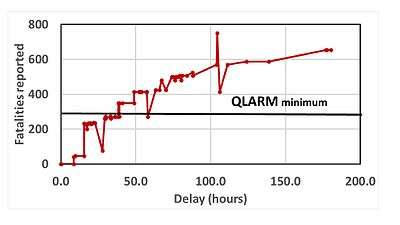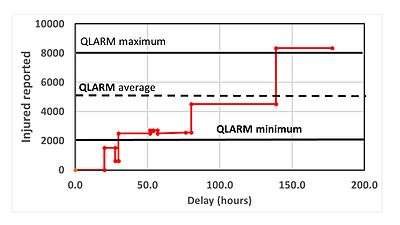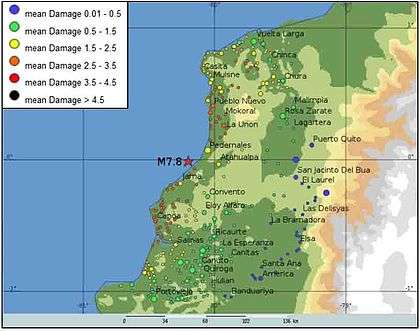2016 Ecuador earthquake
  Muisne Quito Guayaquil | |
| Date | April 16, 2016 |
|---|---|
| Origin time | 23:58:37 UTC[1] |
| Magnitude | 7.8 Mw[1] |
| Depth | 20.6 km (12.8 mi) |
| Epicenter | 0°22′16″N 79°56′24″W / 0.371°N 79.940°W[1] |
| Type | Thrust[1] |
| Areas affected | Ecuador, Colombia, Peru |
| Max. intensity | VIII (Severe) |
| Foreshocks | 4.8 Mw |
| Aftershocks | 1,034 as of 07:50 ECT (12:50 UTC) April 28[2] |
| Casualties | 668 killed, 8 missing and 6,274 severely injured[3] |
The 2016 Ecuador earthquake occurred on April 16 at 18:58:37 ECT with a moment magnitude of 7.8 and a maximum Mercalli intensity of VIII (Severe). The very large thrust earthquake was centered approximately 27 km (17 mi) from the towns of Muisne and Pedernales in a sparsely populated part of the country, and 170 km (110 mi) from the capital Quito,[1] where it was felt strongly.[4] Regions of Manta, Pedernales and Portoviejo accounted for over 75 percent of total casualties.[5] Manta's central commercial shopping district, Tarqui, was completely destroyed.[6] Widespread damage was caused across Manabi province, with structures hundreds of kilometres from the epicenter collapsing. At least 676 people were killed and 16,600 people injured.[7][8][9] President Rafael Correa declared a state of emergency; 13,500 military personnel and police officers were dispatched for recovery operations.
Tectonic setting
Ecuador lies above the destructive plate boundary where the Nazca Plate is subducting beneath the South American Plate. The convergence rate between the plates in Ecuador is 61 millimetres (2.4 in) per year. The depth, location and focal mechanism of the earthquake are all consistent with rupture along the plate interface in the form of a megathrust earthquake. A major earthquake in 1906 ruptured the plate interface for at least 400 km immediately northeast of the 2016 event.[1]
Earthquake

At 18:58 ECT on April 16, a 7.8 Mw earthquake struck the coast of Ecuador approximately 27 km (17 mi) south-southeast of Muisne, in the province of Esmeraldas, at a depth of 20.6 km (12.8 mi).[1] Tremors were felt in neighboring Colombia and Peru;[10] a clinic in Cali, Colombia, was evacuated as a precautionary measure.[11] A tsunami alert was issued by the Pacific Tsunami Warning Center for Colombia, Costa Rica, Ecuador, Fiji, Panama, and Peru.[10][12][13] This is the largest earthquake to strike Ecuador since the 1979 Tumaco earthquake.[14] According to Mayor Gabriel Alcivar, much of the town of Pedernales, about 35 km to the south-southwest of the earthquake's epicenter, was leveled. In Guayaquil—approximately 300 km (190 mi) from the epicenter—an overpass collapsed on a car, killing the driver.[11] In Manta the control tower of the airport was severely damaged;[15] an Air Force officer was injured and the airport closed.[16] Six homes collapsed and many others lost power in the nation's capital city of Quito.[17]
The earthquake was presaged by a magnitude 4.8 foreshock eleven minutes before the main quake struck,[18] and followed by over fifty-five aftershocks in the first twenty-four hours.[19]
Casualties
| Citizenship | Deaths | ||
|---|---|---|---|
| |
651[20] | ||
| |
11[21] | ||
| |
4[22] | ||
| |
3[23] | ||
| |
1[24] | ||
| |
1[25] | ||
| |
1[23][26] | ||
| |
1[23] | ||
| Total * | 676 | ||
| * Some victims had multiple citizenships. Counts are based on preliminary data and may not be complete. | |||
At least 676 people were killed and more than 16,600 others were injured in the earthquake.[7][8] It was the worst natural disaster to hit Ecuador since the 1949 Ambato earthquake.[27] Over 300 fatalities occurred in the cities of Manta and Portoviejo, both of which are located in Manabi province.[5] President Rafael Correa stated that the reconstruction would cost "billions of dollars."[7][28]

The number of fatalities was estimated as several hundred within thirty minutes of the earthquake.[29] However, the media reported the number of fatalities as significantly lower than what actually happened and than what was estimated within thirty minutes as the figure of reported fatalities with time shows. The number of injured reported by media also remained below the ultimate count and below the correct estimate within 30 minutes by QLARM as seen in the next figure.

By April 24, the fatality count had reached 654, and 8,340 had been reported as injured.[30] Estimates of fatalities are based on calculations of the damage to the built environment using the program QLARM.[31] Within minutes of an earthquake only its epicenter is known, not the extent of its rupture. The USGS shake map for this event shown on this page depicts the extent of the rupture area as a rectangle. With the length of the rupture as outlined by the after shocks, a map of the likely mean damage by settlement can be calculated. This map takes into account what intensities have been reported to the USGS for this earthquake. The numbers of fatalities and injured calculated theoretically, based on the damage map shown here, agrees well with the reported numbers.[30]
The extent of the rupture can sometimes be known from aftershocks during the few hours following a main shock. In that case, maps of intensity of shaking expected in each settlement may be calculated as in the figure below at the left for the 2016 Ecuador earthquake. Based on this ground motion, the mean damage expected in each settlement s then calculated. These maps allow first responders to target heavily damaged area.


Large cities tend to have buildings more resistant to shaking than villages, therefore the damage is less for city dwellers than for villagers, on average.
In Colombia, near the city of Cali, one miner died as a result of the earthquake, becoming the only reported death outside of Ecuador.[32]
Aftermath
| Wikimedia Commons has media related to 2016 Ecuador earthquake. |

In response to the earthquake, a state of emergency was declared throughout the country and the national guard was mobilized to assist in rescue and relief efforts.[33] Approximately 10,000 military personnel and 3,500 police officers were deployed.[14] President Rafael Correa cut his trip to Italy short in order to return to Ecuador.[11] Hydroelectric dams and oil pipelines were shut down as a precautionary measure.
On April 17 the International Charter on Space and Major Disasters was activated by UNITAR/UNOSAT on behalf of UN OCHA, thus providing for the charitable and humanitarian re-tasking of satellite assets.[34]
On April 20, a 6.1–6.2 magnitude aftershock struck 15 miles west of Muisne around 3:30AM, local time.[35][36] The quake had a depth of about 9 miles.[35] José Joaquín de Olmedo International Airport in Guayaquil was also closed due to communication issues.[16]
A UNICEF representative reported that the government is considering relocating "one or two" towns in the aftermath of the earthquake. There were also concerns about the Zika virus outbreak and the risk of dengue fever for people displaced by the quake.[37]
Days after the earthquake, the country experienced difficulties distributing food and water to those in need, including the over 26 thousand survivors relocated to shelters. President Correa acknowledged that the poor infrastructure of the country might be to blame.[38] The President estimated the damage at $3 billion, and has obtained credit from the World Bank, Inter-American Development Bank, and other sources, anticipated to reach a total of $2 billion; national sales tax has been raised as have income taxes on Ecuadorians.[39]
See also
References
- 1 2 3 4 5 6 7 "M7.8 - 27km SSE of Muisne, Ecuador". United States Geological Survey. April 17, 2016. Archived from the original on April 18, 2016.
- ↑ "Live: After Ecuador quake, 135 aftershocks reported". The Hindu. Associated Press and Reuters. April 17, 2016. Retrieved April 17, 2016.
- ↑ "Six months report Ecuador: Earthquake" (PDF). ReliefWeb. November 2016.
- ↑ Helsel, Phil (April 16, 2016). "7.8-Magnitude Earthquake Hits Near Ecuador's Coast, 28 Dead". NBC News.
- 1 2 "Secretaría National de Riesgos da lista actualizada de fallecidos en Manabí". El Universo. C.A. EL UNIVERSO. April 16, 2016. Retrieved April 24, 2016.
- ↑ "Tarqui, corazón comercial de Manta, tiene las luces apagadas". El COMERCIO. April 24, 2016.
- 1 2 3 "Ecuador counts over 400 quake deaths, damage in the billions". Reuters UK.
- 1 2 "Ecuador earthquake: Death toll jumps to 272; more than 2,500 injured". CNN.
- ↑ "Ecuador Red Cross" (PDF).
- 1 2 Woodyard, Chris; Solis, Steph (April 16, 2016). "77 killed, hundreds injured in Ecuador's 7.8 earthquake". USA Today. Retrieved April 16, 2016.
- 1 2 3 "Ecuador earthquake of 7.8 magnitude kills dozens". BBC News. April 16, 2016. Retrieved April 16, 2016.
- ↑ "Tsunami warning for Ecuador & Colombia coasts following 7.8 quake". RT. April 16, 2016. Retrieved April 16, 2016.
- ↑ Avinesh Gopal (April 17, 2016). "Tsunami warning for Fiji". Fiji Times. Retrieved April 17, 2016.
- 1 2 Helsel, Phil; Rudansky, Andrew; Dicasimirro, Gemma (April 16, 2016). "77 Dead After 7.8-Magnitude Earthquake Hits Near Ecuador's Coast". NBC News. Reuters. Retrieved April 16, 2016.
- ↑ "7.8 magnitude earthquake hits near Ecuador, according to USGS". Associated Press. April 16, 2016. Archived from the original on April 17, 2016. Retrieved April 16, 2016.
- 1 2 "7.8-magnitude earthquake kills dozens in Ecuador". CBS News. Associated Press. April 16, 2016. Retrieved April 16, 2016.
- ↑ "Massive Ecuador earthquake kills at least 41". New York Post. Associated Press. April 16, 2016. Retrieved April 16, 2016.
- ↑ "M4.8 - 21km N of Pedernales, Ecuador". United States Geological Survey. April 17, 2016. Archived from the original on April 18, 2016.
- ↑ Shankar, Sneha (April 17, 2016). "Ecuador Earthquake: Death Toll Soars, Aftershocks Reported". International Business Times. Archived from the original on April 18, 2016.
- ↑ Menéndez Torres, Teresa (May 18, 2016). "Secretaría de Gestión de Riesgos". Gestión de Riesgos.
- ↑ "Actualización 7:10am #ColombianosEnEcuador: 11 fallecidos, 481 solicitudes de localización (258 ubicados y 223 por ubicar)". April 20, 2016.
- ↑ "2 more Canadians killed in Ecuador quake". CTV News. April 19, 2016.
- 1 2 3 "Ecuador quake toll climbs over 400, damage put at billions of dollars". Reuters. April 18, 2016.
- ↑ "Ecuador quake: Millionaires to be taxed more to pay for relief". BBC News. April 21, 2016. Retrieved April 21, 2016.
- ↑ "Italian businessman among 525 dead in Ecuador quake". The Local. April 19, 2016.
- ↑ Moriarty, Gerry; Jackson, George (April 18, 2016). "Tributes to Irish nun killed in Ecuador earthquake". The Irish Times.
- ↑ "Ecuador quake death toll of 350 expected to rise 'in a considerable way'". Chicago Tribune. Retrieved April 18, 2016.
- ↑ "Ecuador quake toll rises to 413; rebuilding to cost billions". Reuters. April 18, 2016. Retrieved April 18, 2016.
- ↑ "Near Real-Time Earthquake Loss Estimates". www.icesfoundation.org. Retrieved April 29, 2016.
- 1 2 "Ecuador Quake 2016". www.icesfoundation.org. Retrieved May 8, 2016.
- ↑ Wyss, Max (January 1, 2016). "QLARM summary". ICES Foundation. ICES Foundation. Retrieved May 7, 2016.
- ↑ "Minero muere atrapado en Colombia por terremoto que sacudió Ecuador". Ecuavisa. April 19, 2016. Retrieved April 22, 2016.
- ↑ "‘Considerable damage’ in Ecuador following deadly 7.8 quake". Russia Today.
- ↑ "Latest Activation: Earthquake in Ecuador". International Charter on Space and Major Disasters. April 17, 2016. Retrieved May 6, 2016.
- 1 2 "Earthquake Safety and Preparedness". The Weather Channel. April 20, 2016.
- ↑ Martinez, Ana Isabel; Cobb, Julia Symmes (April 20, 2016). "Ecuador disaster toll tops 500, big new quake shakes coast". Reuters. Retrieved April 20, 2016.
- ↑ Ireland, Nicole (April 21, 2016). "Ecuador earthquake destruction could force relocation of towns, UNICEF says". Canadian Broadcasting Corporation. Retrieved April 21, 2016.
- ↑ Reuters (April 21, 2016). "Earthquake survivors in Ecuador struggle without food and basic aid". The Guardian. ISSN 0261-3077. Retrieved April 29, 2016.
- ↑ Sreenivasan, Hari (May 26, 2016). "Ecuador looks to rebuild after devastating earthquake". PBS Newshour. Retrieved July 7, 2016.
External links
-
 Media related to 2016 Ecuador earthquake at Wikimedia Commons
Media related to 2016 Ecuador earthquake at Wikimedia Commons